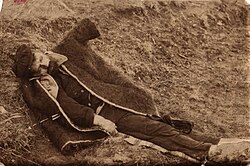Dame Gruev
This article needs additional citations for verification. (May 2023) |
Dame Gruev | |
|---|---|
 | |
| Born | January 17, 1871 |
| Died | December 23, 1906 (aged 35) Petlec Peak, near Rusinovo, Ottoman Empire |
| Nationality | Ottoman/Bulgarian |
| Organization | Internal Macedonian Revolutionary Organization |
Damyan Yovanov Gruev (
Biography
Early years

Dame Gruev was born in 1871 in the village of

Next, Gruev left the university and returned to
1894 to 1900

In the summer of 1894 in
The expansion of the IMRO at the time was phenomenal, particularly after Gruev settled in Thessaloniki during the years 1895–1897, in the quality of a Bulgarian school inspector. Gruev had become the soul and body of the Central revolutionary committee. Under his direction, secret revolutionary papers were issued, ciphers were introduced,
He organized a system in which money was collected from Sunday schools through a special "
Uprising

In the latter part of May 1902, Gruev was condemned to banishment in the prison of
He left Thessaloniki and went to Smilevo where the insurrectionary Congress was to be held. The purpose of this Congress was to set the date for the declaration of the general insurrection and to outline the methods and tactics in its prosecution. Here Gruev met Boris Sarafov, who had just arrived from Bulgaria. Gruev was elected as chairman of this Congress, and the latter decided that the day of the declaration of the insurrection was to be 2 August 1903. Gruev, Boris Sarafov, and Anastas Lozanchev were elected by the Congress as the three members of the General Staff and empowered to direct the insurrectionary forces in the Bitola region. Gruev lived to see the retreat of the Turkish troops from his native village of Smilevo. He was engaged, during the course of the insurrection, in numerous skirmishes with the Ottoman Army. But with the arrival of Ottoman troops, any progress of the insurrection was made impossible and in a period of six weeks, it was completely crushed. Gruev put himself on the task of touring various revolutionary districts, disarming the insurgents, and storing up the war materials for future use. Gruev and his followers continued the work of organization and preparation for another uprising.
After the Uprising

In 1904 Dame Gruev chaired the Prilep Congress of the Bitola Revolutionary District of
Legacy

In his memoirs, IMRO revolutionary Milan Matov wrote that when he met him in June 1906 in Sofia, Gruev told him: "We are Bulgarians and we always work and will work for the unification of the Bulgarian nation. All other formulas are a stage to achieve this goal."[16]
A high school in Sofia[17] as well as Gruev Cove in Greenwich Island, South Shetland Islands, Antarctica are named after Dame Gruev.
In
See also
Notes
- ^ The first names can also be transliterated as Damjan Jovanov, after Дамян Йованов Груев in Bulgarian and Дамјан Јованов Груев in Macedonian. The last name is also sometimes rendered as Grueff. His name is originally spelled in the pre-1945 Bulgarian orthography as Дамянъ Йовановъ Груевъ.[1] Also known in the Serbian historiography as Damjan Grujić (Serbian: Дамјан Грујић).[2]
References
- ^ Спомени на Дамянъ Груевъ, Борисъ Сарафовъ и Иванъ Гарвановъ, съобщава Л. Милетичъ, Издава "Македонскиятъ наученъ институтъ" 1927 г. София, стр. 7.
- ^ Građa za istoriju makedonskog naroda iz Arhiva Srbije: knj. 2. 1886-1887. pp. 220 и 579.
- ^ "In Macedonia, the education race produced the Internal Macedonian Revolutionary Organization (IMRO), which organized and carried out the Ilinden Uprising of 1903. Most of IMRO's founders and principal organizers were graduates of the Bulgarian Exarchate schools in Macedonia, who had become teachers and inspectors in the same system that had educated them. Frustrated with the pace of change, they organized and networked to develop their movement throughout the Bulgarian school system that employed them. The Exarchate schools were an ideal forum in which to propagate their cause, and the leading members were able to circulate to different posts, to spread the word, and to build up supplies and stores for the anticipated uprising. As it became more powerful, IMRO was able to impress upon the Exarchate its wishes for teacher and inspector appointments in Macedonia." For more see: Julian Brooks, The Education Race for Macedonia, 1878—1903 in The Journal of Modern Hellenism, Vol 31 (2015) pp. 23-58.
- ISBN 9789004250765, p. 300.
- ISBN 3034301960, pp. 87-88.
- ^ a b Даме Груев е меѓу најмаркантните македонски лидери, Нова Македонија, 23.12.2022
- ISBN 0691099952, p. 173.
- ISBN 9780429266362, p. 37.
- ISBN 9780810849013, p. 210.
- ^ Mercia MacDermott, Freedom or Death. The Life of Gotsé Delchev. Journeyman Press, London, 1978, p. 96.
- ISBN 9780801469794, İpek Yosmaoğlu, Cornell University Press, 2013, pp. 31–32.
- ISBN 1538119625, p. 133.
- ^ Урош Шешум. Друштво против Срба 1897–1902. Методи и мере бугарске дипломатије, Егзархије и Бугарско-македонско-одринске револуционарне организације против ширења српског утицаја у Јужној Старој Србији и Македонији 1897–1902. (1986) У: Српске студије. - ISSN 2217-5687. - Год. 4, бр. 4 (2013), стр. 73–103. COBISS.SR-ID 203683852.
- ISBN 9780429266362, p. 44; 57.
- ISBN 9781538119624, p. xxvi.
- ^ Dimitar Gotsev, Идеята за автономия като тактика в програмите на национално-освободителното движение в Македония и Одринско (1893-1941) ("The idea of the autonomy as a tactic in the programs of the national liberation movements in Macedonia and Thrace, 1893-1941"). Publishing House of Bulgarian Academy of Sciences, Sofia, 1983, p. 18. (Bg.), Memoirs of Milan Matov "The Comitadji Stories", Skopje, 2002, pp. 260-261.(Mk.), Матов, Милан. "Баш комитата разказва, живот за Македония", Културно-благотворителна фондация „Братя Миладинови“ - София, 2002, p. 266 (Bg.)
- ^ Регистър на училищата и университетите в България - 17 Средно училище Дамян Груев, Град София
- ISBN 1317049365, p. 188.
- ISBN 0299298043, p. 331.
